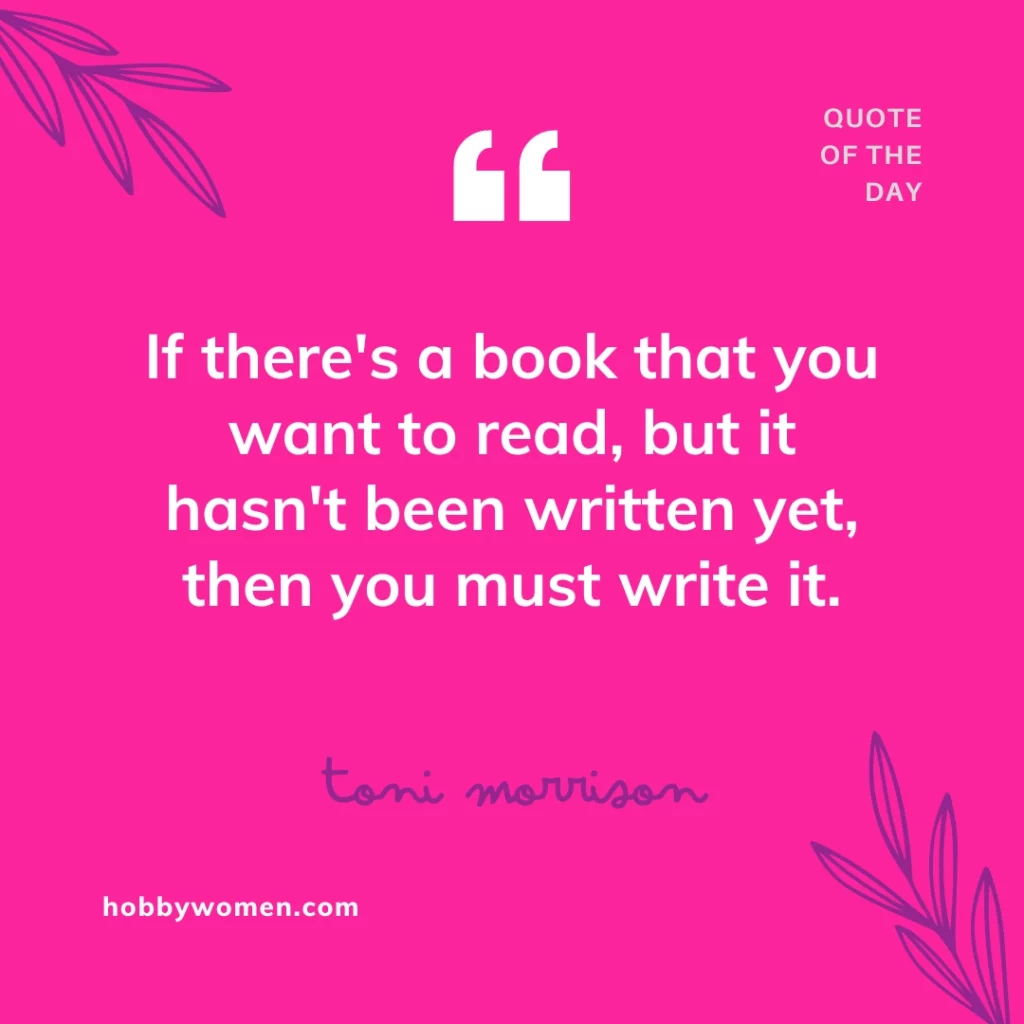This post may contain affiliate links or ads and we may earn a small commission when you click on the links at no additional cost to you. As an Amazon Affiliate, we earn from qualifying purchases. This is at no additional cost to you and helps with our website expenses.
Writing as a hobby is a wonderful way to express yourself, unwind, and explore your creativity.
It’s an activity that allows you to play with words, share your thoughts and experiences, and dive into the fantastic worlds you create.
Is Writing a Hobby?
Certainly! Writing can be a hobby for anyone who enjoys the process of putting their ideas onto paper (or a screen).
Whether you’re scribbling down your thoughts in a journal, crafting a short story, or even writing a blog post, writing can be a fun and engaging pastime that provides countless opportunities for personal growth and learning.
So, if you’ve ever wondered if writing could be a hobby for you, the answer is a resounding yes!
Writing as a Hobby: Exploring Different Forms
Creative Writing
Creative writing encompasses a wide range of genres and styles, including fiction, non-fiction, poetry, and everything in between. Here are some popular forms of creative writing to consider:
- Short stories: Create captivating narratives that can be read in a single sitting.
- Novels: Immerse yourself in the world-building process and develop complex characters.
- Flash fiction: Challenge yourself to tell a complete story in just a few hundred words.
- Creative non-fiction: Blend facts and storytelling to create engaging narratives about real events or experiences.
Journaling
Journaling is the practice of regularly writing down your thoughts, emotions, and experiences. It can be a therapeutic and introspective hobby that helps you process your feelings and gain self-awareness.
Different types of journaling include:
- Personal diary: Write about your daily life, thoughts, and feelings.
- Gratitude journal: Focus on the positive aspects of your life by listing things you’re grateful for each day.
- Travel journal: Document your adventures and experiences while exploring new places.
- Dream journal: Record your dreams and analyze their meanings and patterns.
Blogging
Blogging allows you to share your ideas, opinions, and experiences with an online audience. It’s an excellent way to connect with like-minded individuals and even build a community around a specific topic.
Some popular blogging niches are:
- Personal blogs: Share your life experiences, thoughts, and opinions.
- Travel blogs: Document your travels, share tips, and inspire others to explore the world.
- Food blogs: Write about cooking, baking, or your favorite eateries.
- Hobby blogs: Share your passion for a specific hobby, like photography, gardening, or crafting.
Poetry Writing as a Hobby
Poetry is a beautiful form of creative expression that uses language, rhythm, and imagery to convey emotions, ideas, and stories.
There are many different forms and styles of poetry, such as:
- Sonnets: A 14-line poem with a specific rhyme scheme, often about love or beauty.
- Haikus: A three-line poem with a 5-7-5 syllable pattern, traditionally focusing on nature and seasons.
- Free verse: A type of poetry without a specific structure or rhyme scheme, allowing for greater flexibility in expression.
- Limericks: A humorous, five-line poem with a distinctive rhyme pattern (AABBA).
Let’s do some fun examples of writing poetry…about writing.
An old-time sonnet about writing.
When pen meets paper, magic doth ensue,
A world of words and thoughts doth come to life,
A canvas blank, now filled with vibrant hue,
A symphony of phrases, free from strife.
A hobby grand, to write and to create,
To weave a tale, to paint a picture true,
You capture moments, both big and small, great,
To share with others, a part of you.
With every stroke of pen, a soul doth speak,
A voice unique, a story to be told,
A world of wonder, for all to seek,
A treasure trove of memories, to hold.
So let us write, with passion and with grace,
And share our gifts, with the human race.
Now, here’s a haiku…about writing!
Ink flows on paper,
Words dance with imagination,
Writing as my bliss.
An example of a free-form poem about writing as a hobby.
Writing is my refuge, my escape,
A world where I can truly shape,
The thoughts and dreams that fill my mind,
And leave the real world far behind.
With pen in hand and paper near,
I let my thoughts and feelings steer,
The words that flow so effortlessly,
Creating worlds that I can see.
Characters come to life on the page,
Their stories unfolding with each new stage,
I watch them grow and learn and change,
As I write, my world expands and ranges.
Writing is a journey, a path to explore,
A way to express what’s deep at the core,
Of who I am and what I believe,
A way to connect and to achieve.
So I’ll keep writing, day after day,
Letting my thoughts and feelings play,
And maybe one day, my words will inspire,
Others to write and to reach higher.
Last but not least a limerick about writing as a hobby!
There once was a writer so keen,
Her pen and paper, a perfect team,
She wrote with such flair,
Her words filled the air,
Writing was her ultimate dream.
Scriptwriting
Scriptwriting involves creating scripts for various forms of media, such as movies, TV shows, plays, and even video games.
This type of writing requires a unique skill set, as it focuses on crafting dialogue, building scenes, and developing characters within a visual and auditory context.
Some forms of scriptwriting include:
- Screenwriting: Write scripts for movies or TV series, focusing on visual storytelling, character development, and dialogue.
- Playwriting: Create scripts for theatrical performances, with a strong emphasis on dialogue, character interactions, and stage directions.
- Radio dramas: Write stories to be performed as audio productions, focusing on dialogue, sound effects, and atmosphere.
- Game writing: Develop narratives, dialogue, and characters for interactive experiences like video games or virtual reality.
By exploring these different forms of writing, you can find the one that best suits your interests, passions, and creative expression.
Each type of writing offers its own unique challenges and rewards, making it easy to keep your hobby engaging and fun.
How to Start Writing as a Hobby
Where to Start Writing as a Hobby
The best place to start writing as a hobby is right where you are! All you need is a notebook or a computer and the desire to write.
To help you get started, consider the following:
- Choose a writing form that interests you, such as creative writing, journaling, or blogging.
- Set aside a dedicated time and space for writing, free from distractions.
- Experiment with different writing prompts and exercises to spark your creativity.
- Join a writing community or group, either online or in person, to share your work and receive feedback.
Setting Realistic Goals and Expectations
When starting a new hobby, it’s essential to set realistic goals and expectations. Here are some tips to help you set achievable writing goals:
- Start small: Set short-term, manageable goals, like writing for 15 minutes a day or completing a short story in a month.
- Be patient: Understand that improvement takes time and practice.
- Embrace the learning process: Accept that not every piece of writing will be perfect, and use each experience as a learning opportunity.
Finding Inspiration and Ideas
Inspiration can be found in the world around you, from your personal experiences to the books, movies, and music you enjoy.
To find ideas for your writing, try the following:
- Observe the world around you: Pay attention to people, places, and events that spark your interest.
- Use writing prompts: Search online for prompts or use prompt generators to stimulate your imagination.
- Read widely: Discover new ideas and perspectives by reading books, articles, and blogs in various genres and styles.
Tips for Beginners
Before diving into the world of writing, it’s essential to have some guidance to help you navigate the journey.
From establishing a regular writing routine to seeking feedback and staying curious, these tips are designed to help you build a strong foundation for your new hobby.
So, without further ado, let’s delve into the tips that will help you unleash your inner writer!
- Write regularly: Establish a consistent writing routine to build your skills and stay motivated.
- Seek feedback: Share your work with friends, family, or writing groups to gain valuable insights and improve your writing.
- Edit and revise: Don’t be afraid to rewrite and refine your work; it’s an essential part of the writing process.
- Stay curious: Continuously learn and explore new writing techniques, styles, and genres.
Embrace Imperfection
As a beginner, it’s important to remember that your first drafts won’t be perfect, and that’s okay.
Allow yourself the freedom to make mistakes, and view each one as an opportunity to learn and grow as a writer.
Find your Writing Tribe
Connecting with other writers can be incredibly beneficial for beginners.
Seek out local writing groups, online forums, or social media communities where you can exchange ideas, share your work, and offer support to fellow writers.
Read like a Writer
As you read books, articles, or any other written material, pay attention to the author’s writing style, word choice, and storytelling techniques.
Analyze what works and what doesn’t, and consider how you can apply these lessons to your own writing. This practice will not only help you develop a deeper appreciation for the written word but also refine your skills as a writer.
How to Start Creative Writing with No Experience
Embarking on a creative writing journey can seem daunting, especially when you have no prior experience. But fear not!
Every great writer had to start somewhere, and with the right approach, you too can unleash your creativity and craft captivating stories.
- Focus on the basics: Learn the fundamentals of storytelling, such as character development, setting, and plot structure.
- Experiment: Try different writing styles, points of view, and genres to find your unique voice.
- Take a course or workshop: Enroll in a creative writing class or workshop to learn new techniques and receive guidance from experienced writers.
Creative Writing Prompts to Kick Things Off
Creative writing prompts are ideas, statements, questions, or scenarios designed to inspire writers and spark their imagination.
These prompts serve as a starting point for writing, helping to overcome writer’s block, stimulating creative thinking, and encouraging the development of new stories, characters, or settings.
They can be used by writers of all experience levels to explore different genres, styles, and themes, or to practice specific writing techniques.
Creative writing prompts can come in various forms, including:
- Text prompts: A phrase, sentence, or paragraph that suggests a situation, character, or theme.
- Visual prompts: Images or photographs that inspire a narrative or evoke emotions.
- Dialogue prompts: A line of dialogue that can be used as a foundation for a scene or conversation between characters.
- First line prompts: A suggested opening sentence for a story, challenging the writer to build a narrative around it.
- Genre-specific prompts: Ideas tailored to specific genres, such as mystery, romance, or science fiction, to help writers explore different styles and storytelling conventions.
Using creative writing prompts can be an effective way to break through writer’s block, generate new ideas, and improve your writing skills.
The Benefits of Writing as a Hobby
Personal Growth and Self-Expression
Writing as a hobby offers numerous opportunities for personal growth and self-expression. It enables you to explore your thoughts, feelings, and experiences, fostering self-awareness and a deeper understanding of your emotions. By experimenting with different styles, genres, and forms of writing, you can also discover your unique voice and perspective, further enriching your self-expression.
Mental and Emotional Well-Being
Engaging in writing as a hobby can have significant benefits for your mental and emotional well-being. Writing can be therapeutic, helping you process emotions, make sense of your experiences, and gain clarity on your thoughts.
Journaling, in particular, has been shown to reduce stress, improve mood, and enhance overall mental health.
Moreover, creative writing provides a healthy outlet for self-expression, allowing you to channel your emotions and experiences into art.
Improved Communication Skills
Practicing writing as a hobby can significantly enhance your communication skills. Writing requires you to organize your thoughts, convey ideas clearly, and engage your audience effectively.
As you hone your writing skills, you’ll also develop a stronger command of language, grammar, and vocabulary, which can positively impact your verbal communication, critical thinking, and problem-solving abilities.
Building a Supportive Community
Writing as a hobby often leads to connecting with others who share your passion.
Joining writing groups, participating in workshops, or engaging with online writing communities can provide you with valuable feedback, encouragement, and camaraderie.
Building a supportive network of fellow writers not only enriches your writing experience but also helps you develop a sense of belonging and fosters lasting friendships.
Final Thoughts and Conclusion on Writing as a Hobby
Now that you have a better understanding of writing as a hobby, we encourage you to take the plunge and start exploring the world of words.
Remember, there’s no “right” way to begin—simply choose a form of writing that interests you and give it a try. Be patient with yourself, embrace the learning process, and above all, enjoy the journey.
Writing can be a deeply rewarding and fulfilling hobby that not only enriches your life but also opens up new opportunities for personal growth, creativity, and connection. Happy writing!







